The film ended. The fluorescent lights stuttered and flickered into life.
“We just have time for a few questions,” said Miss Rheingold.
Hands shot up all over the room. Miss Rheingold beamed with pleasure and satisfaction.
“Yes, Spike,” she said.
“How do they get those Ping-Pong balls to stay on the mousetraps like that?” She was poised to take notes.
“I—I don’t really know,” said Miss Rheingold. “Um, Peter?”
“Do you think a little piece of tape would do it?” I asked. “If you curled it around and stuck it back on itself, the way you do when you want to stick something up on the wall without using a tack?”
“I guess it would,” said Miss Rheingold. “But that’s not really what—”
“Rubber cement,” called Dave Botsch, from the back of the room. These were the first words I’d ever heard the overgrown thug volunteer in a classroom in the seven years that he’d been attending school with me. Even his highly persuasive arguments about the wisdom of my giving him portions of my lunch were mostly nonverbal. “You can steal it from the supply closet in the art room,” he elaborated. “First cabinet on the left. One little drop on each ball. Let it dry a little, so it’s just tacky. Then set it in place. Carefully.” With that he lapsed again into his accustomed silence and did not break it again from that day to the day he quit school nearly four years later, when he said something that I remember as “Yaaaaahhhh!”
“Well—” said Miss Rheingold. “And you, Bill?”
“Can you use just regular mousetraps, or do you have to get that model 235 they were using there in the movie?”
It took Miss Rheingold a moment to recognize what a depth of misunderstanding underlay this question. When she did, her shoulders and the corners of her mouth dropped simultaneously. “Oh,” she said, or perhaps she just moaned. The bell rang.
We hear from time to time about the power of an idea to influence people, as individuals and in the mass. Usually it’s politicians, religious fanatics, or pop philosophers who expect to use ideas to whip people into line, but the most powerful idea I’ve ever encountered had nothing to do with phony promises, false gods, or bogus ontologies. It was that table covered with mousetraps and Ping-Pong balls. Now that was a powerful idea! I would guess that, at minimum, 95 percent of the students in Miss Rheingold’s class walked out of the Purlieu Street School that afternoon with the firm determination to make whatever sacrifice might be necessary to acquire a Ping-Pong table and a couple of dozen mousetraps and balls, and recreate the experiment we’d seen in Quanto the Minimum. I know that most of us didn’t actually do it, but that isn’t surprising. In time the task must have come to seem too hard, or much less important than other tasks that came along, or even just plain silly. It takes a special mind to stick to a determination to do something just for the hell of it, the kind of mind my great-great-grandfather Black Jacques Leroy had and few others do.
[to be continued]
Have you missed an episode or two or several?
You can begin reading at the beginning or you can catch up by visiting the archive or consulting the index to the Topical Guide. The Substack serialization of Little Follies begins here; Herb ’n’ Lorna begins here; Reservations Recommended begins here; Where Do You Stop? begins here.
You can listen to the episodes on the Personal History podcast. Begin at the beginning or scroll through the episodes to find what you’ve missed. The Substack podcast reading of Little Follies begins here; Herb ’n’ Lorna begins here; Reservations Recommended begins here; Where Do You Stop? begins here.
You can listen to “My Mother Takes a Tumble” and “Do Clams Bite?” complete and uninterrupted as audiobooks through YouTube.
You can ensure that you never miss a future issue by getting a free subscription. (You can help support the work by choosing a paid subscription instead.)
At Apple Books you can download free eBooks of Little Follies, Herb ’n’ Lorna, and Reservations Recommended.
You’ll find overviews of the entire work in An Introduction to The Personal History, Adventures, Experiences & Observations of Peter Leroy (a pdf document) and at Encyclopedia.com.






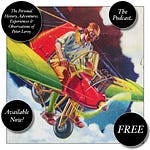



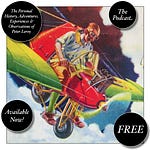
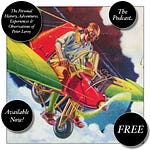
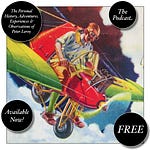
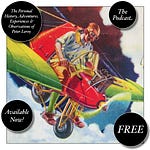
Share this post